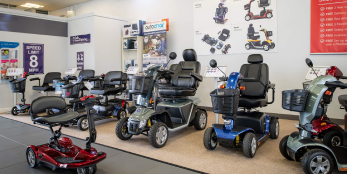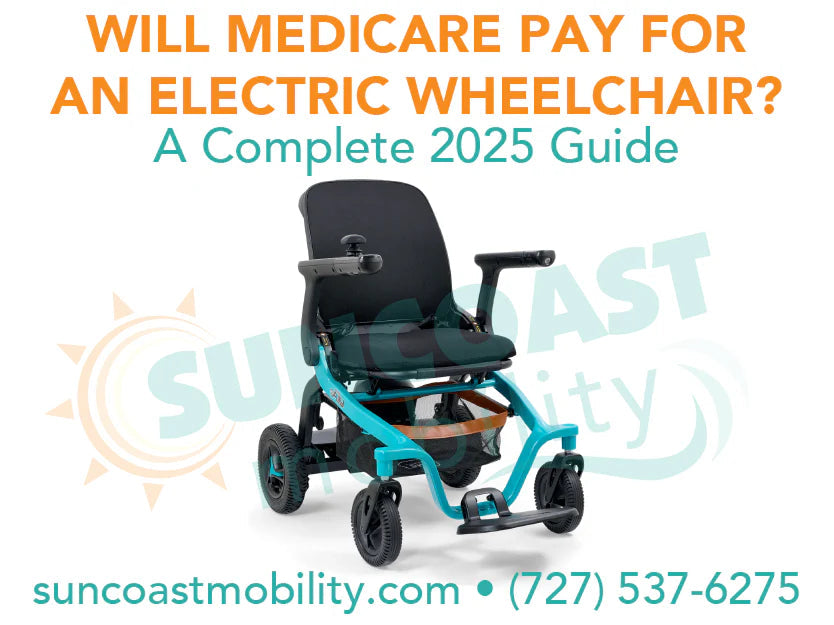Table of contents
Will Medicare Pay for an Electric Wheelchair? A Complete Guide
For individuals with mobility challenges, an electric wheelchair can mean the difference between dependence and independence. These advanced devices offer maneuverability, comfort, and freedom—indoors and outdoors. However, their cost can be a significant burden for many individuals and families. One of the most commonly asked questions is: Will Medicare pay for an electric wheelchair? In this comprehensive guide, we break down everything you need to know, from Medicare eligibility to coverage criteria, costs, and how to start the process.
What Is an Electric Wheelchair?
An electric wheelchair, also known as a power wheelchair, is a battery-powered mobility device designed for people who cannot walk or self-propel a manual wheelchair. These wheelchairs are equipped with a joystick or other controls and are ideal for individuals with more severe mobility limitations, especially those needing daily assistance.
Unlike scooters, electric wheelchairs typically offer:
Better indoor maneuverability
Tighter turning radii
Power seating options such as tilt, recline, or seat elevation
More advanced support for postural needs
They are also considered more medically necessary for individuals who are unable to operate a manual chair or scooter due to their physical condition.
Understanding Medicare Coverage for Durable Medical Equipment (DME)
Before diving into the key question—Will Medicare pay for an electric wheelchair?—it’s important to first understand how Medicare defines and covers mobility devices under its Durable Medical Equipment (DME) benefit.
Durable Medical Equipment (DME) is a specific category under Medicare Part B that includes medically necessary equipment used to manage or treat health conditions in the home. These items are designed for long-term, repeated use and are not typically useful to someone who isn’t sick or injured. Electric wheelchairs fall within this category when prescribed to assist with serious mobility limitations.
To qualify as DME under Medicare guidelines, the equipment must meet the following criteria:
Medically Necessary: The item must be essential for treating a diagnosed medical condition. For electric wheelchairs, this means you must have a mobility-related disability that significantly limits your ability to perform daily activities in your home—such as bathing, dressing, or moving from room to room.
Reusable: DME must be durable and able to withstand repeated use over time. Electric wheelchairs meet this standard due to their long-term functionality and sturdy design.
Serves a Medical Purpose: The equipment must directly support the treatment or management of a diagnosed medical issue. In the case of power wheelchairs, they enable individuals to maintain mobility and independence, which is often critical to their physical and emotional well-being.
Used in the Home: Medicare coverage only applies to equipment that is primarily used in the patient’s residence. Devices intended mainly for outdoor or recreational use are not covered. The justification for needing the electric wheelchair must focus on in-home functionality, such as getting to the bathroom, kitchen, or bedroom.
Prescribed by a Medicare-Enrolled Doctor: Your healthcare provider must be enrolled in Medicare and must conduct a face-to-face evaluation. This step is required to assess your need for a power wheelchair and to document your mobility limitations in detail.
It’s also worth noting that not only must your doctor be Medicare-approved, but so must the supplier who provides the electric wheelchair. If either the doctor or supplier is not enrolled, Medicare will not cover the cost—even if you meet all other requirements.
The Centers for Medicare & Medicaid Services (CMS) has specific documentation requirements for power mobility devices. These documents must include a detailed written order, physician notes supporting medical necessity, and an assessment of your ability to operate the wheelchair or have a caregiver assist you safely.
Once all of these conditions are met, and if Medicare determines the device is medically necessary, Medicare Part B typically covers 80% of the approved cost, leaving you responsible for the remaining 20%, unless you have supplemental insurance such as a Medigap policy or are enrolled in a Medicare Advantage Plan.
In summary, answering the question “Will Medicare pay for an electric wheelchair?” requires a clear understanding of DME criteria and ensuring all necessary steps are followed—from physician evaluation to supplier qualification. When done correctly, this process can significantly reduce out-of-pocket costs and provide you with the mobility solution you need to live more independently.
What Are the Medicare Requirements?
To qualify for coverage, Medicare Part B requires a detailed process:
1. Doctor’s Evaluation and Prescription
You must visit a Medicare-approved physician who will assess your medical need for an electric wheelchair. The doctor must document:
Your inability to use a cane, walker, or manual wheelchair
Your need for a power wheelchair to perform daily activities in the home
That you can safely operate or have someone available to assist with operation
2. Face-to-Face Examination
A face-to-face exam is mandatory and must be completed within six months of the written order for the wheelchair.
3. Prior Authorization
Medicare requires prior authorization for most power wheelchairs. Your doctor and supplier will submit this documentation to Medicare. If approved, Medicare will cover 80% of the cost, and you or your secondary insurance will pay the remaining 20%.
Will Medicare Pay for an Electric Wheelchair in Full?
Medicare Part B typically pays for 80% of the Medicare-approved amount for a power wheelchair, assuming all eligibility conditions are met. You will be responsible for the remaining 20%, along with any annual deductible if it hasn’t already been met.
Depending on the model and features of the chair, your out-of-pocket expenses can vary. If you have a Medicare Supplement (Medigap) plan, it may help cover the 20% not paid by Medicare.
Will Medicare Pay for an Electric Wheelchair for Home Use?
Medicare’s coverage is based on medical necessity within the home. This means:
You must need the electric wheelchair to safely and independently move around your residence.
Outdoor use, while beneficial, is not a qualifying reason on its own.
If your home cannot accommodate the device, Medicare may deny coverage.
So if you’re asking Will Medicare pay for an electric wheelchair?, keep in mind that the justification must focus on in-home mobility—not leisure or outdoor activities.
Will Medicare Advantage Plans Cover Electric Wheelchairs?
If you’re enrolled in a Medicare Advantage Plan (Part C), your coverage for electric wheelchairs may differ slightly.
Many Medicare Advantage plans follow the same general guidelines as Original Medicare but often require:
Pre-authorization from the insurer
Use of in-network doctors and suppliers
Specific copayment structures
Additional documentation or evaluations
Some plans may also cover upgraded features or offer lower copays. Always confirm the coverage details with your Medicare Advantage provider.
What Types of Electric Wheelchairs Are Covered?
If you're asking, Will Medicare pay for an electric wheelchair?, it’s important to understand that Medicare only covers certain categories of power wheelchairs that meet specific criteria. These are divided into groups based on functionality and medical necessity:
Group 1: Basic Indoor Models
Group 1 power wheelchairs are designed for individuals who need assistance primarily inside the home. These models typically have basic functionality, limited suspension, and no advanced seating features.
Examples:
Pride Jazzy Select 6 – A reliable, budget-friendly model suitable for flat indoor surfaces.
Golden Technologies LiteRider Envy – Lightweight and compact, perfect for users needing simple in-home mobility.
Group 2: Enhanced Mobility and Comfort
Group 2 power wheelchairs offer better performance, improved suspension, and optional seating adjustments, making them suitable for both indoor use and limited outdoor terrain. These chairs are often approved for Medicare if the user requires additional support for stability or longer distances.
Examples:
Pride Jazzy Elite ES – Offers excellent stability with larger drive wheels and front-wheel drive for tight turns.
Merits Health Vision Sport (P326A) – Features mid-wheel drive and a comfortable captain’s seat, designed for better control and support.
Golden Compass Sport – Designed for increased maneuverability and comfort, with a generous turning radius and all-around suspension.
Group 3 and Higher: Complex Rehab Chairs
These chairs are designed for individuals with neurological, muscular, or skeletal conditions, such as ALS, MS, or spinal cord injuries. Group 3 models offer advanced electronics, power seat functions, and specialized positioning. Medicare coverage for Group 3 chairs requires strong documentation and justification from your healthcare provider.
Examples:
Merits Health P327 Vision Ultra – A Group 3 model with high weight capacity, excellent support, and advanced seat elevation.
Pride Quantum Series – Customizable complex rehab chairs with multiple power positioning options and specialty drive controls.
Key Takeaway
Medicare most commonly approves Group 1 or Group 2 electric wheelchairs. Approval for Group 3 or higher models requires thorough documentation from your physician demonstrating that a lower-level chair does not meet your medical needs.
When selecting a wheelchair, your prescription must align with your medical necessity and mobility goals, whether it's navigating your home, attending appointments, or living more independently.
What If Medicare Denies My Claim?
If your request for an electric wheelchair is denied by Medicare:
You can appeal the decision. Your supplier or healthcare provider can help you file an appeal and submit additional documentation.
Review your paperwork carefully to ensure all requirements were met and properly documented.
Consult your local SHIP (State Health Insurance Assistance Program) for free support.
Suncoast Mobility’s Role
While Suncoast Mobility is not enrolled as a Medicare provider and cannot directly bill Medicare, we often work with customers who:
Purchase their electric wheelchair outright
Pursue reimbursement from Medicare directly after purchase
Need assistance navigating Medicare eligibility and documentation
We are A+ rated with the Better Business Bureau and are proud to help seniors and individuals with disabilities find reliable, long-lasting mobility solutions.
Why Choose an Electric Wheelchair?
An electric wheelchair may be a better fit than a mobility scooter if:
You need daily in-home assistance
You have upper body limitations that make manual propulsion difficult
You require tight indoor maneuvering
You benefit from powered seating features like tilt, recline, or elevation
Frequently Asked Questions
Will Medicare pay for an electric wheelchair for outdoor use?
No, Medicare only covers electric wheelchairs that are medically necessary for use within the home . Outdoor or community-based justification alone is insufficient for coverage.
Can I Pick Any Electric Wheelchair I Want?
No, Medicare only covers specific models approved for medical necessity. If you want premium features or upgraded models not deemed necessary, you may have to cover the additional cost.
How long does the approval process take?
The time frame can range from 1–4 weeks, depending on the supplier’s and doctor’s submission speed and whether pre-authorization is required.
Can I upgrade my Medicare-covered electric wheelchair with added features?
Medicare typically covers only the basic model needed for medical necessity. If you want additional features like power seat elevation or custom cushions, you may have to pay the difference out of pocket. Always check with your provider first.
How long does it take to get a Medicare-approved electric wheelchair?
The process can take several weeks. It involves a face-to-face exam, a prescription from a Medicare-enrolled physician, and documentation from a DME supplier. Timelines vary depending on how quickly paperwork is completed and approvals are granted.
Final Thoughts: Will Medicare Pay for an Electric Wheelchair?
Navigating Medicare can be complicated, but knowing the rules helps. To answer the question clearly: Will Medicare pay for an electric wheelchair? Yes—if it is medically necessary, prescribed by your doctor, and approved by Medicare.
Remember, Medicare will:
Cover 80% of the cost if criteria are met
Require a face-to-face evaluation and documentation
Only cover use primarily in the home
If you’re still wondering, Will Medicare pay for an electric wheelchair?, don’t hesitate to consult a Medicare representative or your physician.
At Suncoast Mobility, we are here to help you through every step—from understanding your options to selecting the perfect wheelchair. Our experienced team is just a phone call away at 727-537-6275.












